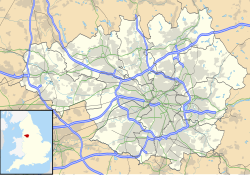History
Alt is located in the historic parish of Ashton–under–Lyne. Historically part of the Hundred of Salford. The favourable topography of the old settlement (above the river) and the nearby find of a Bronze Age flint adze suggest that the area may have been occupied in prehistoric times. During the Roman period the land was probably cleared of timber for cultivation, but by about AD 550 woodland regeneration suggests a reduced population and a decline in the climate. The land was once more cleared, probably between AD 610 and 740, and finally in about AD 850.
At Domesday in AD 1086, Alt was probably a manor within the parish of Ashton. It is first recorded in the 1200s when Thomas, son of William of Alt claimed land in Palden; the name may derive from the Old Welsh for allt hill or ‘village amongst the hills'. The Old Welsh name of allt suggests the area had an existing population, a community that had survived the Anglo Saxon colonisation of the area in the 7th century AD. The name may also refer to Alder trees in the manor, locally once called owlers.
The hamlet of Alt Fold was situated at the junction of Sommerfield View, Alt Lane and Alt Fold Drive. Originating in the medieval period, was a second hamlet at Pitses, located at the junction of Holts Lane and Abbey Hills Road. James Butterworth the Oldham historian described it in the early 1800s as ‘being surrounded by pools of water'.
Throughout the medieval period the Alt area was probably arable land farmed in strips as part of an open field system, though it may also have included some pasture.
Coal mining in Alt has been known from the early 1700s with pits in Alt and Fairbottom, whilst the name Pitses may indicate the presence of early coal pits.
The abolition of Limehurst Rural District in 1954 enabled the County Borough of Oldham to extend development into the former semi rural area, building the Alt estate and its associated schools, playing fields etc. Development did not however encroach upon Alt Fold, though this ancient area was entirely cleared in the late 1960s. [3]
This page is based on this
Wikipedia article Text is available under the
CC BY-SA 4.0 license; additional terms may apply.
Images, videos and audio are available under their respective licenses.

